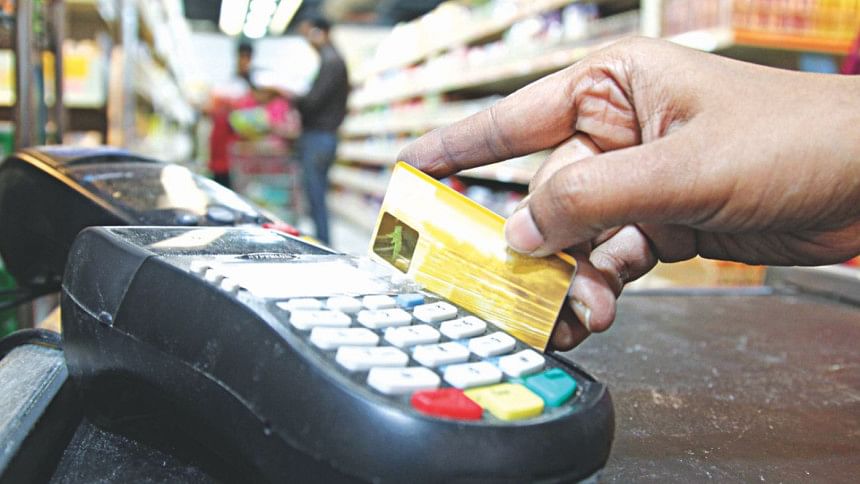Credit card market still untapped

Corporate executives and businessmen quite often get stupefied with phone calls from banks selling credit cards.
It is a surprise for many that banks want to give credit willingly, even going to the doorstep of customers with the product.
Once you say you want it, the marketing crew of the banks will not leave you alone until you sign along the dotted line. These loans are processed the fastest with minimum document requirements.
A monthly income of Tk 20,000 can give you credit worth at least Tk 50,000 on the card. The upper limit may be as high as Tk 10 lakh.
Despite all the efforts, the product is yet to gain momentum in the country. As of May, there are less than 10 lakh issued credit cards in the country, according to data from the Bangladesh Bank.
Bankers blame the stalemate on the limited purchasing power of consumers and a lack of infrastructure. Some of them said the mandatory requirement of a tax identification number or TIN also hamper the growth of the card.
Though per capita income has increased to about $1,600, the actual purchasing power or real disposable income of people in Bangladesh is still very low, said Mashrur Arefin, additional managing director of City Bank.
"Bangladesh is still a low income country, where credit card is seen as a credit facility by banks and consumers alike, and not as a lifestyle transaction vehicle. This makes a huge difference in understanding and appreciating the value of credit card."
The credit card market will not achieve its expected level of growth unless the Bangladesh economy graduates to the next level and appreciates cashless transactions, Arefin said.
The lack of infrastructure -- point-of-sales terminals and automated teller machines -- is a big barrier to the expansion of the credit card market in Bangladesh, said Anwar Hossain, head of cards and alternative delivery channels at Mutual Trust Bank.
"Credit card requires huge investments, from POS to ATMs and marketing costs. Moreover, it's a collateral-free product, for which the risk is very high."
The installation of a POS terminal costs Tk 30,000 and it goes as high as Tk 10 lakh to Tk 15 lakh for an ATM.
Moreover, banks also have to offer incentives and discounts to attract credit card customers, the MTB official said.
Nazeem A Chowdhury, head of consumer banking of Eastern Bank, a fast growing player in the sector, attributed the slow growth to the non-negotiable requirement for TIN.
"Many customers cannot enjoy the facility because they don't have a TIN," he added.
Shafiqul Alam, managing director of Jamuna Bank, said he is very surprised to see such a small number of credit cards in Bangladesh.
"In many countries around the world, the number of credit cards is higher than the number of cell phones. But in Bangladesh, the two numbers are not even comparable," Alam said.
He, however, disagreed with Arefin of City Bank that the credit card is a lifestyle product.
"It's a basic product and the consumers can avail any amount, may be Tk 1,000, depending on his/her requirement," Alam said.
But the main problem lies with the infrastructure, even in the capital, he added.
Bankers also said issues related to tax act as a fear factor for card users who think that their expenses will be tracked down by the tax administrator.
Many people refrain from taking credit cards due to the growing cyber crime, said Ahmed Kamal Khan Chowdhury, managing director of Prime Bank.
Chowdhury too said the credit card is not a product for the masses.
"The benefits the credit card users enjoy can be given through debit cards also to encourage cashless transactions. People do not feel the necessity of availing credit cards, as banks also sell many loan products that the cards offer," he said.
Still Standard Chartered Bank, the pioneer in this field in Bangladesh, is hopeful about the prospects of the product.
Aditya Mandloi, head of retail banking of SCB in Bangladesh, said they have been operating in the country for over 112 years and have become ingrained in the growth story of the nation's economy.
"We remain committed to introducing innovations from around the globe in Bangladesh, so that we could offer our customers the best in-class financial products and services," he added.
The slow growth can also be attributed to a fear of excessive charges and interest rates.
It is one of the costliest forms of borrowing, where any credit card outstanding balance could carry an annual interest as high as 36 percent. The average interest rate for credit cards in the country is nearly 30 percent.
This makes it imperative for a user to clear the outstanding amount within the allocated timeframe. Credit cards do not date back too far in Bangladesh.
SCB, after acquiring Grindlays Bank's Bangladesh operations, introduced the product two decades ago.
In the first 5-6 years, it got a huge response from consumers because it reduced the risks of carrying cash and fostered expensive purchases.
Now almost all of the 39 local private banks offer the product, often competing with each other for clients. These banks have Visa, Mastercard, Diners Club and American Express credit cards.
City Bank is the biggest player in the credit card market in Bangladesh, followed by SCB and EBL.
Presently, City has a total 326,347 credit cards, of which 233,170 are the high-end American Express cards and the rest are Visa cards.
Brac Bank, Dhaka Bank, United Commercial Bank and Dutch-Bangla Bank are also strengthening their foothold in the market that still has a huge potential.

 For all latest news, follow The Daily Star's Google News channel.
For all latest news, follow The Daily Star's Google News channel. 



Comments